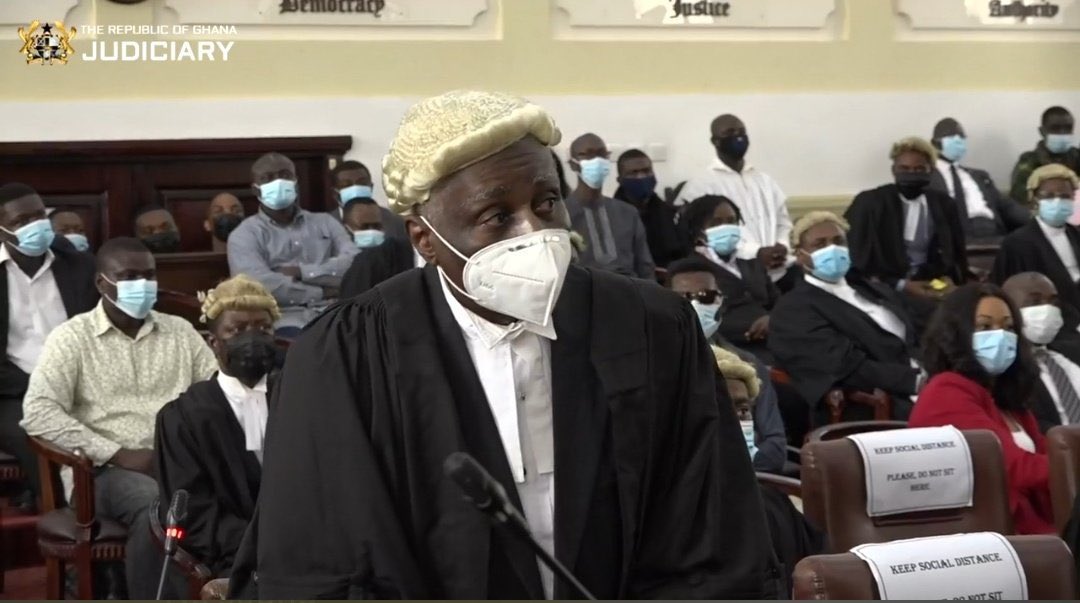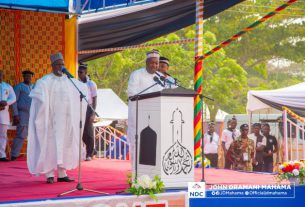The Supreme Court has dismissed an application filed by John Dramani Mahama asking it to review a decision to disallow him from asking the Electoral Commission some 12 questions.
This was after two additional justices, Justice Imoro Tanko and Justice Henrietta Mensah Bonsu were added to the initial seven-member panel hearing the election petition.
Lead Counsel for the petitioner, Tsatsu Tsikata had argued that the interrogatories are relevant as it would help the apex court determine the authenticity of the result that was declared on December 9, 2020, by the EC.
Again, he explained that order 22 under CI 47 can still be applied since it will not affect the 42-day timeline the court wants to meet under the CI 99.
But giving its ruling, the court held that the threshold required to enable it to review its decision has not been met.
Chief Justice Kwasi Anin-Yeboah explained that no exceptional circumstances have been demonstrated to necessitate the review powers of the court neither has any new evidence been added to urge the court to take a different view.
This dismissal follows a similar ruling on another application by the petitioner, Mr. Mahama, to replace paragraph 28 of the original statement of case, as well as file a supplement to their statement of case requesting for the review.
Mr. Mahama, through his legal team, had argued that the court will not only be provided with further information if the application was granted but the interrogatories will not delay the petition hearing.
But the nine-panel of judges unanimously dismissed the supplementary application and proceeded to hear the review application which was also subsequently dismissed.
The case has since been adjourned to Friday, January 29, 2021.
Background
Mr. Mahama’s lawyers on January 20, 2021 filed a motion asking that the court reviews its decision.
They say the court erred when it ruled that CI 47 was not applicable. They also argue that the court should have exercised its discretionary powers in accordance with article 296 of the constitution.
This provision requires an authority vested with discretionary power to be fair and candid. They further stated that the court got it wrong yet again when it took the view that the current rules requiring expeditious trial mean even amendments are not allowed.
Mr. Mahama on Monday, January 25 filed another process asking to be permitted to file additional ground to support the review requested.
This ground seeks to argue that the court’s ruling was characterized by a lack of due regard to the law or facts (per incuriam) relative to article 129 (4) of the constitution and the court’s decision in Ex Parte Magna International Transport Ltd and Bernard Mornah v AG.
129(4) states that; “For the purposes of hearing and determining a matter within its jurisdiction and the amendment, execution or the enforcement of a judgment or order made on any matter, and for the purposes of any other authority, expressly or by necessary implication given to the Supreme Court by this Constitution or any other law, the Supreme Court shall have all the powers, authority and jurisdiction vested in any court established by this Constitution or any other law.”
They also want to replace paragraph 28 of the original statement of case (that of the review) and additionally file a supplement to the statement of case.
Paragraph 28 in the initial review document stated among others “there is no reference in rule 69(c) 4 of CI 99 to amendments.
It is rather 69 A (6) which provides as follows ….”.
The proposed new paragraph in the bit about “it is rather” quoted 68(7) instead of the 69A(6) quoted earlier.
Source: Felicia Osei & Joseph Ackah-Blay




